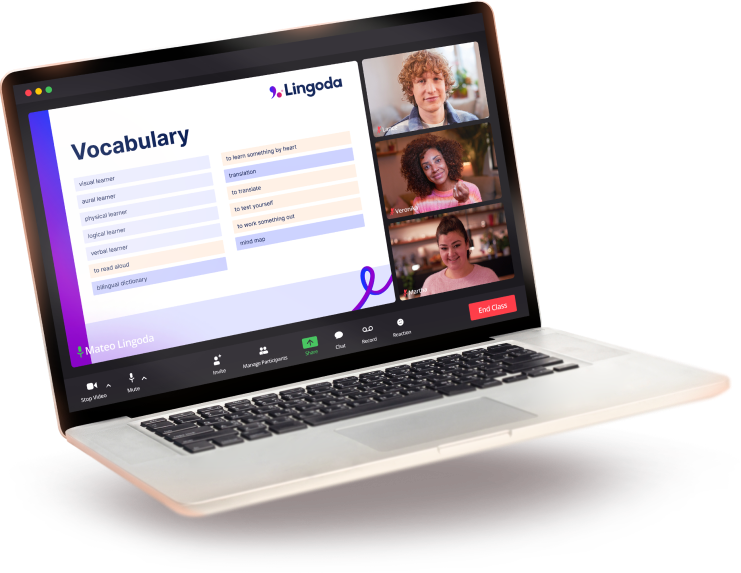


Set yourself up to win with the Sprint: 15 classes/month or the Super Sprint: 30 classes/month.



Sign-up closes in6days



Set yourself up to win with the Sprint: 15 classes/month or the Super Sprint: 30 classes/month.



Learn from professional language teachers in live Zoom-classes. Practise speaking and get individual feedback.



Finish the Language Sprint and follow all rules to earn 50% of your money back, or even more as class credits!





Everything for living and working in German-speaking countries.


Join in on one of the most spoken languages of the world.


Take your career to the next international level.


Feel like a local when you speak French with confidence.


Dive into the rich culture of this widespread language.


Take your first steps into the Bel Paese's language and culture.
Hear how our students transformed their first language steps into life-changing moments. Let their stories motivate you to get your own language wins.

The Language Sprint is only open to new Customers who have never had an active subscription with Lingoda. This does not include the Free Trial as it is not an active subscription. Upon registering for the Sprint Promotion, you automatically sign up for a one-month subscription. The payments will be automatically charged using your selected payment method upon registration and on 3. June 2025. To foster the skills learned during the Sprint Promotion, your course automatically rolls into a regular Lingoda subscription after the Sprint Promotion is over. If you would like a break after your Sprint, you can change your post-Sprint subscription during the Sprint Promotion month.
You can download all Language Sprint rules here. Please familiarise yourself with them. You need to follow all the Language Sprint rules as well as Lingoda’s T&Cs in order to earn your cashback.
You can learn English and German from A1 to C1, French, Spanish and Business English from A1 to B2. Italian is only available for A1.
Complete a placement test and find out your level.
German
English
French
Spanish
Italian
Change your level at any time during the Language Sprint if you find it too easy or difficult or if you’ve completed a level. This will not affect your refund eligibility.
All classes must be taken in the respective months of the Language Sprint:
For regular Sprint: 15 classes in Month 1 and 15 classes in Month 2.
For Super Sprint: 30 classes in Month 1 and 30 classes in Month 2.
A Sprint Promotion month is defined as follows:
Month 1: from 12. May 2025 (00:00 CET) to 10. June 2025, (23:59 CET)
Month 2: from 11. June 2025 (00:00 CET) to 10. July 2025, (23:59 CET)
You can’t take more classes than stated above during the Sprint runtime. You also can’t take more than 1 class a day for Sprint and Super Sprint and not more than 5 classes per week for Sprint.
The Language Sprint is designed to be a challenge and push your boundaries! Depending on your motivation it might feel hard or not. But thousands of students who succeeded before will testify that the effort is worth it for the language skills – and 14.000 of them earned the cashback.
Teachers at Lingoda are experienced professionals who love to teach. They are qualified, native-level speakers from all over the world. They will teach you versatile language skills and cultural insights into different social and workplace situations.
You can download all course materials for free from your account. No additional materials or textbooks are required. Plus, Lingoda offers homework and a quiz after your lessons, so you can keep practising.
If it’s due to confirmed technical issues on Lingoda’s side, the class will still count towards your Language Sprint. Once we have confirmation that the fault lies with Lingoda, we will update your account and refund your class credit. Please note, you can only use the refunded credit after the challenge ends. Using it during the Language Sprint (e.g. 16 classes in Month 2 of the Sprint instead of 15 classes) will result in you no longer being eligible for a cashback.
If you missed the class due to problems on your side, you will not be refunded the class credit nor are you eligible for the cashback.
You can, of course, continue taking your Language Sprint classes and developing your language skills!
After the Language Sprint ends, The Student Team will check if you’re eligible for a refund. This first part can take up to 2 weeks. If you qualify, we will send you your cashback (50% of the total amount you paid for the Sprint or the Super Sprint) to the same payment method you used to pay for the Language Sprint. Please note you can also choose to receive class credits of a higher value instead of money and continue learning (30 classes for Sprint, 60 classes for Super Sprint). This second part, the refund itself, can take up to 4 weeks. So in total, the process can take approximately 40-45 days.
You can join the Language Sprint as long as you never had an active Lingoda subscription before. Existing students can participate in the Language Sprint, but are automatically excluded from the rewards (cashback or free credits). Alternatively, you can choose one of our more intense monthly packages (i.e. 20 or 40 classes per month).
